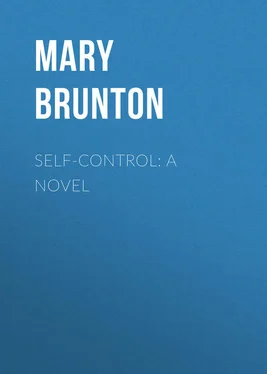Mary Brunton - Self-control - A Novel
Здесь есть возможность читать онлайн «Mary Brunton - Self-control - A Novel» — ознакомительный отрывок электронной книги совершенно бесплатно, а после прочтения отрывка купить полную версию. В некоторых случаях можно слушать аудио, скачать через торрент в формате fb2 и присутствует краткое содержание. ISBN: , Жанр: foreign_antique, foreign_prose, на английском языке. Описание произведения, (предисловие) а так же отзывы посетителей доступны на портале библиотеки ЛибКат.
- Название:Self-control: A Novel
- Автор:
- Жанр:
- Год:неизвестен
- ISBN:http://www.gutenberg.org/ebooks/41196
- Рейтинг книги:5 / 5. Голосов: 1
-
Избранное:Добавить в избранное
- Отзывы:
-
Ваша оценка:
- 100
- 1
- 2
- 3
- 4
- 5
Self-control: A Novel: краткое содержание, описание и аннотация
Предлагаем к чтению аннотацию, описание, краткое содержание или предисловие (зависит от того, что написал сам автор книги «Self-control: A Novel»). Если вы не нашли необходимую информацию о книге — напишите в комментариях, мы постараемся отыскать её.
Self-control: A Novel — читать онлайн ознакомительный отрывок
Ниже представлен текст книги, разбитый по страницам. Система сохранения места последней прочитанной страницы, позволяет с удобством читать онлайн бесплатно книгу «Self-control: A Novel», без необходимости каждый раз заново искать на чём Вы остановились. Поставьте закладку, и сможете в любой момент перейти на страницу, на которой закончили чтение.
Интервал:
Закладка:
Unwilling to own, even to herself, the extent of her anxiety and disappointment, Laura talked to her father of his visit, with which he had been highly pleased. He had been amused with Harriet; charmed with Mrs De Courcy; and doubly charmed with Montague, whom he praised as a scholar and a man of sense, as an affectionate brother and a respectful son; and, to crown all these commendations, he declared, that De Courcy was more than a match for himself at chess.
When they retired for the night, Laura returned to her conjectures on the cause of Hargrave's delay. She considered that he might have been detained on the road, or that he might have found it necessary to make a visit on his way. She had little doubt, that to see her was the object of his journey to London at this unfashionable season. She had none, that he would hurry to her the first moment that it was possible. By degrees, she persuaded herself into an absolute certainty that she should see him on the following day; and on that day, she again took her anxious station in the parlour.
She was ashamed to lean over the window, and could not otherwise see who entered the house; but she left the room door ajar, that she might have warning of his approach, held her breath to distinguish the voices from below, and listened eagerly to every footstep. At last, she imagined that she heard the wished-for inquiry. She was sure some one pronounced her name. A man's step ascended the stair; Laura trembled and her breath came short. She feared to look up, and leant her face on her hand to conceal her emotion.
The voice of her visitor made her start, and turn her head. It was Warren!
Expectation had been wound up to its highest pitch, and Laura could not instantly recover herself. She paid her compliments with a confusion and trepidation, which Warren interpreted in a way most flattering to his vanity. He approached her with a look, in which ill-suppressed triumph contended with laboured condescension; and spoke to her in a voice that seemed to say, 'Pray, endeavour to reassure yourself.' But Laura was in no humour to endure his impertinence, and she seized the first opportunity to leave the room.
Captain Montreville soon entered on the business in which he took such painful interest, by inquiring whether any traces had yet been discovered of the sale of his daughter's annuity. Warren, with abundance of regret and condolence, informed him, that Williams had as yet been able to discover no mention of the transaction in the books.
This assertion was so far true, that Williams had as yet seen no record of the business in question; for which Mr Warren could, if he had chosen, have given a very satisfactory reason. From the moment this gentleman had first seen Laura, he had been determined not wilfully to expedite her departure from London; and therefore he had casually dropped a hint to his man of business, that, as he was already overwhelmed with a multiplicity of affairs, it was unnecessary to hasten a concern of such trivial importance; and that he might defer inquiring into the sale of the annuity till he was at perfect leisure. Had he insinuated to Williams, that this delay was detaining from his home a man who could ill afford the consequent expence, or that it was alarming a father for the future subsistence of his only child, the man of business would have found leisure to investigate the matter, even if he had subtracted the necessary time from his hours of rest. But the upright Mr Warren had given no such intimation; and in this honourable transaction, he was, for the present, secure from detection, for he knew that business had called his agent to a distance from London.
Captain Montreville knew not what to think. He could not doubt the integrity of Mr Baynard, nor could he imagine to what purpose Warren should deny the transaction; since, if it had really taken place, the vouchers of it must be found among his deceased friend's papers. He was persuaded that to examine the books according to the date of the sale, would be the work of only a few hours; and again he inquired whether the necessary examination had taken place. Mr Warren answered, that he could not take it upon him to say that every possible search had yet been made; but his agent, he said, had examined all the most probable records of the concern, and would, on his return to town, make a still more particular scrutiny.
With this unsatisfactory answer, Captain Montreville was obliged to content himself. He had only one alternative – either to wait in London the appointment of the person who was to arrange Mr Baynard's papers, or to return to Scotland, and resign all hopes of the annuity. He feared, too, to offend Warren by urging him too strongly, since, even should a voucher of the payment of his £1500 be found, the informality in the deed would still leave room for litigation. No merely personal interest would have induced the high spirit of Montreville to conciliate a man whom he despised as a fool and a coxcomb. – For nothing that concerned himself alone, would he have submitted to the trouble and anxiety which he had lately undergone. Ill calculated by nature to struggle with difficulties, he had long been accustomed to let the lesser disasters glide by without notice, and to sink, without effort, under the greater. Disappointed in the woman of his choice, and deprived, by her folly or perverseness, of the domestic pleasures which he loved, his mind had taken a cast of melancholy. Early secluded from society, and tormented by the temper of his wife, he had concentrated all the affections which solitude confined, and caprice rejected, upon one object: and Laura became the passion of his soul. The thought of leaving her destitute, of leaving her sensibility to the scorns, her beauty to the temptations of poverty, was more than he could bear, and it sometimes almost overpowered him. He was naturally inclined to indolence, and as, like all indolent people, he was the creature of habit, his spirits had suffered much from the loss of the woman who, though too heartless for a friend, and too bitter for a companion, had, for twenty years, served him as a sort of stimulus. The same force of habit, joined to her improving graces and confirming worth, made Laura daily more dear to him, and he would willingly have given his life to secure her independence and happiness.
Brooding on the obscurity in which she must remain, whom he judged worthy to adorn the highest station – on the poverty which awaited her during his life – on the want to which his death must consign her, – removed from his habitual occupations, and deprived of the wholesome air, and exhilarating exercises to which he had long been accustomed, he allowed his spirits to grow daily more depressed. Along with the idea of the misfortunes which his death would bring upon his darling, the fear of death settled on his mind. The little ailments to which the sedentary are liable, he magnified into the symptoms of mortal disease; and momentary pain seemed to his fancy to foretell sudden dissolution. Montreville was fast sinking into a melancholy hypochondriac.
His daughter's spirits, too, failed under continued expectation, and continued disappointment; for day after day passed on, and still Hargrave came not. Her father's dejection increased her own, and her ill-disguised depression had a similar effect on him. While, however, Captain Montreville gave way without effort to his feelings, the more vigorous mind of Laura struggled to suppress the sorrow which she saw was contagious. She sometimes prevailed upon her father to seek amusement abroad, sometimes endeavoured to amuse him at home. She read to him, sung to him, exerted all her conversation talent to entertain him; and often, when all was in vain, when he would answer her by forced smiles, languid gestures, or heavy sighs, she would turn aside to wipe the tears from her eyes, then smile, and attempt her task again.
Читать дальшеИнтервал:
Закладка:
Похожие книги на «Self-control: A Novel»
Представляем Вашему вниманию похожие книги на «Self-control: A Novel» списком для выбора. Мы отобрали схожую по названию и смыслу литературу в надежде предоставить читателям больше вариантов отыскать новые, интересные, ещё непрочитанные произведения.
Обсуждение, отзывы о книге «Self-control: A Novel» и просто собственные мнения читателей. Оставьте ваши комментарии, напишите, что Вы думаете о произведении, его смысле или главных героях. Укажите что конкретно понравилось, а что нет, и почему Вы так считаете.












